Virginia CEOs Report Economic Outlook in 2013 4th Quarter Survey
For the fifth quarter in a row, Robins School of Business –Virginia Council of CEOs survey finds staffing and economic uncertainty concerns to be the most significant business issues among Central Virginia executives.
(Read Richmond Times Dispatch coverage)
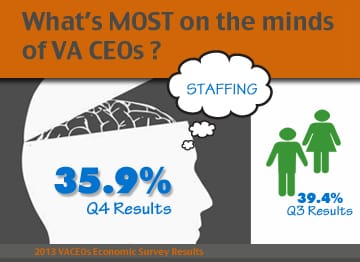 Each quarter the Virginia Council of CEOs (VACEOs) and University of Richmond’s Robins School of Business partner to take the pulse of top executives in the region.
Each quarter the Virginia Council of CEOs (VACEOs) and University of Richmond’s Robins School of Business partner to take the pulse of top executives in the region.
The survey results provided by Jeff Pollack, assistant professor of management at the Robins School of Business, provide a snap shot of the overall economic outlook index for various companies within the region and help central Virginia companies anticipate business decisions and plan for growth. This quarter the survey finds a drop in the overall outlook index of top executives compared to the previous quarter. The survey also reports, as it has since the fourth quarter of 2012, that staffing and economic uncertainty still weigh heaviest on the minds of Central Virginia CEOs.
Says Scot McRoberts, executive director of the Virginia Council of CEOs, “As unemployment has eased, it seems that small business CEOs are finding a tightening in the labor market. They remain wary of hiring unless they absolutely have to, and then are finding it tough to hire, especially for highly skilled positions.”
VA CEOs Economic Performance for Q4 2013 – Q2 2014
Among the executives of small and mid-sized companies participating in the survey, 35.9 percent said staffing is the most important business issue, a slight decrease from the 39.4 percent Q3 2013 findings. Economic uncertainty increased with 20.3 percent of executives agreeing it is the most significant issue, up from last quarter’s 19.7 percent.
When asked how their company’s U.S. employment will change in the next six months, over 55 percent of executives said they expected higher or significantly higher compared to only 50 percent of respondents last quarter.
“We see in these data a bit of a decrease in optimism. Indications are more neutral (no change expected) with regards to sales in the next six months by a greater number of CEOs, 25 percent relative to last quarter’s 21 percent—though still a large majority, 68.8 percent, anticipate sales increasing,” said Jeff Pollack, assistant professor of management at the Robins School.
Pollack continues, “Views about capital spending are more pessimistic at 15 percent relative to last quarter’s 9 percent, though a majority anticipates no changes. For capital spending, we saw an 8 percent shift out of the neutral area where 4 percent more of these CEOs anticipate increases but 4 percent more anticipate a decrease. Staffing issues, slow growth and economic uncertainty are the top three areas of concerns noted by the current sample of CEOs.”
Survey Results
The following survey results from the second and fourth quarter of 2013 show projections for the next six months for sales, spending and employment:
Economic Outlook Index
The results also provide an overall economic outlook index, which is based on businesses’ projected six-month sales, spending and employment figures.
About the 2013, Fourth Quarter Robins School of Business / VACEOs Economic Survey
The Quarterly Outlook Survey is conducted jointly by the Virginia Council of CEOs and University of Richmond’s Robins School of Business and is an adaption of the national Business Roundtable survey conducted by an association of CEOs of American companies.
The council and the Robins School collected responses from 80 CEOs in central Virginia. The average annual revenue year-to-date for CEOs responding was $37.9 million. The data were compared to the third quarter of 2013 responses of 80 participants. Multiple industries are represented in the sample (for example, construction, manufacturing, finance and insurance, and retail). The average employment of member companies for this survey was 49.
Request Results
The VA Council of CEOs continues to expand the survey beyond its members, offering any area business owners whose companies gross at least $1 million in annual revenue the opportunity to participate. If enough businesses participate, the Council will provide survey results by industry. Participation is free, and all participants will receive copies of the survey data.
Business owners and CEOs who would like to participate in the next survey should contact Scot McRoberts at smcroberts@vaceos.org.
About the Virginia Council of CEOs
The Virginia Council of CEOs is a nonprofit organization, whose mission is to connect the CEOs of second-stage companies so they can learn from each other and grow their businesses. Learn more at www.vaceos.org.
About the Robins School of Business
The Robins School of Business is the only fully accredited, top-ranked undergraduate business school that also is part of a top-ranked liberal arts university. Bloomberg Businessweek ranks both the Robins School’s undergraduate and part-time MBA programs among the top 20 in the country in their respective categories. The school’s executive education division offers open enrollment courses and customized leadership development programs for individuals and businesses.
VACEOs Member Profile: Randy Sklar of Sklar Technology
“It happened kind of naturally,” says Randy Sklar, when asked if there was one pivotal moment when his father handed him the reins to the family business. “I remember it was around 2001, when the economy started to go sour and our business was really suffering. He began to look toward me for guidance. I suggested we move away from retail where the return was just too low. I began to focus on our commercial accounts and developed a new program for them that eventually brought us the cash we needed at the time. We even turned a profit that year. That was the turning point.”
Randy later got some words of wisdom from two family business owners in his Roundtable: transitioning from second-in-command to primary business owner will have its bumps. It takes courage and faith, they said, and they were ready to help guide him through the exit strategy.
Today, Sklar Technology is a multi-million dollar company in the middle of a remodel. Randy plans to add more employees to his team of 13, and the preventive maintenance program he brought to the once ailing technology company is still an important part of his business, along with a program that thwarts malware which can cripple a business in minutes.

Computer Corner to Sklar Technology
Sklar Technology began under a different name. In 1982 the business was called the Computer Corner, which back then more aptly described the retail-focused computer shop. As the commercial accounts and range of services grew, a name change was required in 2007 — to the chagrin of Randy’s father. But this was yet another necessary step to capture more accounts. It was also another example of son Sklar’s growing decision making power.
The company has shaken its retail services and has evolved to offer technology management and consulting, network administration and general IT support services to large and small commercial accounts located primarily in the Richmond region.
Randy explains his services in more detail: “Most small companies don’t have internal IT department to overlook their network and give support to the system users. We’re here to be an outsourced, virtual IT person. We handle all the normal services a company requires, like security, end user support, 24/7 monitoring and automated backup/rapid recovery services.”
He adds, “We see our customer’s data as an important asset, but unfortunately business leaders are typically delegating one of the most important areas of the business to the wrong person, persons who don’t have the skill or don’t understand the importance of a security breach, for example. Our customers are those who really depend on and value their data.”
When Ransomware Attacks…
Ransomware is a class of malware that restricts access to an infected computer system. To “get your computer back” you must pay the malware creator a ransom — which typically means coughing up several hundred dollars worth of bit coins.
Sound like a movie script? It’s not. It’s real and small to mid-size businesses are an easy target, says Randy. “People think that these culprits ‘break into’ your system. That’s not true. Businesses are tricked into installing the malicious software. It can be very disruptive. We’re helping a number of local businesses deal with this problem on a regular basis.”
The malware can lock up systems or erase data. For small businesses, it could mean appointments disappear, customer’s accounts are erased, or accounting systems are corrupted.
“Our unique approach is in our proprietary programs and processes. We start with a Risk Assessment to determine what assets are critical to the business and where relevant vulnerabilities exist, then we mitigate these threats and finally we implement our programs and services to keep the data secure and highly available for the end users. The key isn’t to stop this process, security is a discipline. Education and understanding is critical from a leadership standpoint, this is a business issue not an IT issue,” explains Randy.
Clearly the family business has evolved over the last three decades. When you speak with Randy in his office, you can’t help but see pictures of his young family scattered on his desk and on each shelf. We have to ask, “Will the children take over the business?” “There’s no pressure to do that,” Randy is quick to say, but then adds with a smile, “But, they DO already have business cards.”
Seems likely that Sklar Technology, no matter who is at the helm, will always be a family business.
Why Join VACEOs? Hear What Members Have to Say (Video)
Interested in joining the VACEOs, but just not sure what you will get out of it? Maybe this video will help. It’s a brief introduction to the Virginia Council of CEOs. View About the Roundtable Experience video to learn even more.
About the Roundtable Experience (Video)
Interested in the Virginia Council of CEOs, but just not sure if it’s for you? Maybe this video will help. It’s a brief explanation of the benefits and responsibilities of Virginia Council of CEOs membership; along with an explanation of the CEO Roundtable program.

Preparing for the Healthcare Hurricane
“Will the Affordable Care Act change the way you operate your business?” Over 53% of the Central Virginia CEOs in our most recent CEO survey agreed it would. But we wonder, exactly how will it change? Will it be simply a matter of renegotiating your insurance coverage? Or, will the dramatic costs associated with the federally subsidized program force you to create an entirely NEW way to operate your business — one where part time and low wage employees are shifted away from your direct control?
The new law, which will require companies with 50 or more workers to provide affordable coverage to their full-time employees or risk tax penalties, has been delayed to 2015. Still, a more immediate deadline looms: October 1, 2013, when the Healthcare Exchange (HIX) opens its enrollment period for 2014.
The fact is, the number of low wage employees on your payroll who participate in the HIX could significantly impact your organization’s profitability, no matter the size of your business.
To best understand how this enrollment process and how the ACA law would impact Virginia businesses, we brought in D.C. – insider Rich Boehling. Rich is president of Productiv, Inc. When not leading his business of over 350 employees, he is acting as a “business barometer” with a direct line to the Treasury and Department of Labor. Joining him, his associate Rush Paul, a “recovering lawyer” with over 30 years HR leadership experience.
Together they educated the 25+ CEOs in the workshop about the law and presented a case for a strategy that COULD create a seismic shift in how some organizations operate. It was in depth and intense. Concepts like “wage bands”, “safe harbors”, and “L2 employees” were introduced; one couldn’t help but feel a slight panic in the room.
VACEOs Speak Out…
“This Workshop was especially interesting to me as the Affordable Care Act will affect the way my business operates. The most important point I took away from the discussion was that the way many mid to large size businesses hire and manage employees will be significantly different in the future. In order to remain profitable, many CEOs will be forced to change their employment practices in ways that will not be in the best interest of either customers or employees.” – Tom W., ServiceMasters Services, Inc.
Preparing for the Healthcare Hurricane: Think Big. Act Small.
Rich presented data from a fictitious, mid-sized company called PBandJ to demonstrate how the Affordable Healthcare Act will impact a CEO’s profit margins; he used relatable employee, sales, and revenue data and presented a significantly different employment strategy to bring targeted workers into a safe harbor zone.
In the end, using a B to B subcontracting model for employee and process management was the ONLY solution that brought the fictitious company a profit. The other options, downright gloomy.
Miss the event? We encourage you to visit PBJandACA.com to download the presentation. The VACEOs recommendation? Plan NOW for October 1 and beyond. Take an employee inventory, meet with your executive team, and find a strategy that works best for you.

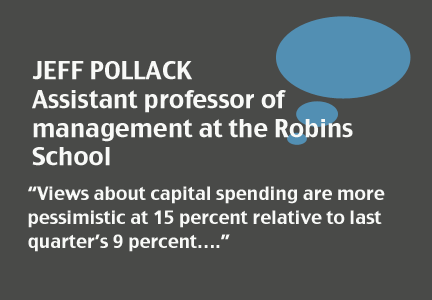
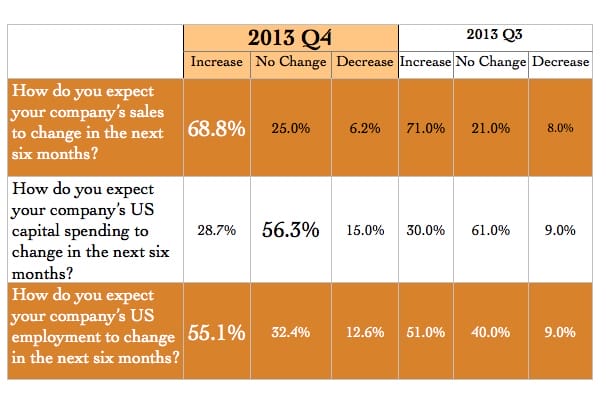



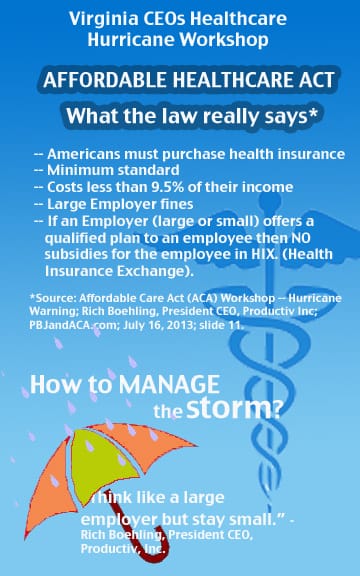
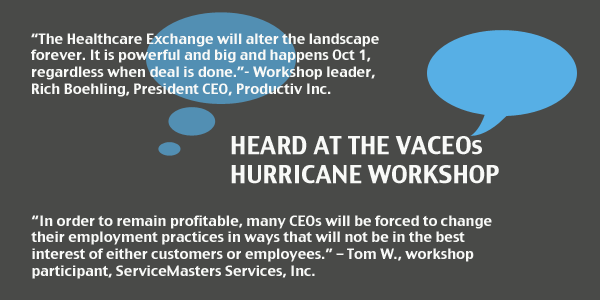
Recent Comments